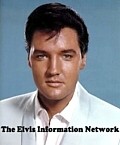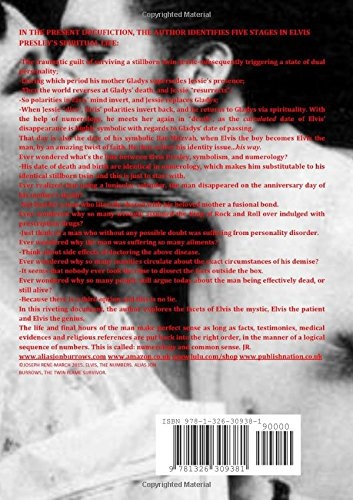Book Review:
Elvis, The Numbers
Alias Jon Burrows, The Twin Flame Survivor
by Joseph Rene
|
Publishnation.co.uk/Lulu.com (USA), 2015, Softcover (perfect bound), 335 pages, Illustrated, Sources and Bibliography, Photography Credits, ISBN: 978-1326309381.
Reviewed by Nigel Patterson, January 2016
...Review...
"[The universe] cannot be read until we have learnt the language and become familiar with the characters in which it is written."
.................Galileo (Italian astronomer, physicist, engineer, philosopher, and mathematician)
Describing Joseph Rene's new book is problematic. Beyond its broad definition as a work of "docufiction" (creative non-fiction), its blending of standard biographical elements with analyses based on occult (esoteric) methodologies (numerology, astrology and palmistry) and a liberal dash of psychology, do not easily lend it to fuller denotation or explanation. However, I will endeavour to define it later in my review.
Given its unusual nature for what the author offers I suspect the primary audience will largely identify itself. While not all readers will accept the author's thesis, it is nevertheless an interesting and potentially rewarding reading experience for both its primary audience and other readers willing to consider its content with an inquiring mind.
The introductory chapter Elvis: the diffracted portrait of a man is perceptive and nicely sets the scene for what is to follow. To perceive Elvis, The Numbers as a work based simply on what some consider to be pseudoscientific numerological and astrological beliefs would miss the broader intent and impact of the book. The author appropriately describes his intention as:
The principle behind this book is to talk about Elvis' sensibility and intelligence when it comes to questions we all ask ourselves, fundamental questions that is, such as existentialist and philosophical ones.
In Elvis, The Numbers, the author identifies the five stages of Elvis' spiritual life. The use of metaphor is strong throughout the narrative and whether or not you believe in the power of numbers or that the stars influence who we are, there is plenty in Elvis, The Numbers to challenge and encourage you to consider a different way of considering Elvis Presley.
Complementing the unusual approach to its subject are key themes around the concepts of dual personality, the search for identity and resurrection.
The book title's tag line is the intriguing:
Alias Jon Burrows, The Twin Flame Survivor
A second tag line evokes equally vivid imagery:
August 16th 1977, The Rocking Bar Mitzvah of a King
And internal sections bear the equally intriguing titles:
Elvis and spirituality: "Elvis the palmist, Elvis the genius"
The Return of the Jedi and the Force
The prophets and the Holy Grail
The author offers an often fascinating consideration of his core subject:
Hallucinations-either phonic or visual-weight problems, specific sleeping patterns, unusual and dangerous behaviour are typical features in Elvis Presley's life. Unfortunately, the court surrounding the King would see him only through the wrong end of the telescope and misinterpret those features for excessive drug usage, very poor food habit, over-excitement or over-generosity-in the latter example, much to their own profit. Alas, recent studies show that all the above patterns are the symptoms of what is called "schizoaffective disorder".
-----------------------
Finally, the number of rings Elvis was wearing on his hands increased over the years. From no ring at the beginning of his career, he was wearing big rings at several fingers during his later years. Wearing several rings usually suggest insecurity, the rings being there to give courage.
The narrative is broad and often enigmatic. Death, Judaism and the carrying of tragic secrets are important motifs, with a seminal moment being the death of Elvis' beloved mother, Gladys. The author cleverly uses a comment by the late John Lennon (in an interview with Rolling Stone magazine) as a segue into considering the impact of the death of Gladys Presley:
"I'd like to resurrect Elvis. But I'd be so scared of him I don't know whether I could do it."
Issues around Elvis' 'physical' death are examined as are the relevance of the misspelling of Elvis' middle name Aron/Aaron and the prospect Elvis was cryogenically preserved (frozen) post death. Colonel Tom Parker's role is generally viewed in a negative light and the book includes a detailed EPE account of the circumstances of the RCA-Colonel Parker-EPE litigation case post Vernon Presley's death.
Some concepts presented in the book, while simply explained, undoubtedly will be difficult to comprehend for some readers:
In an effort to sum up Presley's personality, let's go back to the term diffraction: it is the process by which a beam of light or other system of waves is spread out as a result of passing through a narrow aperture or across an edge, typically accompanied by interference between the wave forms produced.
Information from among other things, Elvis' astrological chart, various numerological influences including his birth date (8) and a detailed palmistry analysis all help to produce a portrait of Elvis' personality, ego, key drivers (motivating factors and values), inner conflicts and more. Importantly, they provide a body of evidence to reveal the real Elvis and are a key to his destiny.
In discussing numerology and the interpretation and importance of numbers the author offers fascinating revelations when considering the Hebraic calendar in the context of the deaths of Elvis and Gladys. On this matter, he poses a tantalising question: coincidence or ultimate encrypted message?
In framing his story, Rene reasonably draws on Elvis' interest in occult themes and his search for identity. I expect some non-occult readers will be critical of aspects of the author's portrait of Elvis, questioning the application of broad, generalised descriptions under numerology and astrology to any person, including Elvis. Similarly, the consideration of biopsychogenealogy is likely to be controversial.
The counter argument is that similar criticisms can be made against the ascribing of broad psychological and psychiatric indicators to individuals (not to mention the dilemma of competing psychological and psychiatric theories on human behavior).
Students of the occult will readily understand the concepts and analysis detailed in Elvis, The Numbers. Those readers unfamiliar with occult methodologies should not be deterred by the, at times, opaque technical nature of the narrative (the above excerpt being one example), as it is worth persevering with (note: the mathematical elements underpinning numerology are relatively simple to grasp). Having said that, my feeling is that a more detailed (lay) methodological explanation (for example, discussing fadic (number) reduction) segue into the occult/esoteric analyses would have made understanding easier for many "lay readers".
In addition to using occult analysis to explain Elvis and his life, the author also neatly interweaves a number of Elvis conspiracy" themes including a very clever interpretation of the amazingly persistent Elvis is alive belief and the more obscure story that Lisa Marie Presley was "switched" at a young age.
The fictional elements of the story use major and prosaic incidents in Elvis' life (e.g. his fall in the shower before filming Clambake) as a narrative device.
So just what sort of book is Elvis, The Numbers? In my opinion it is quite simply, an engaging docufictional, occult psychobiography of Elvis Presley!
The book design is solid. Each page is neatly linear with largish font size, good line spacing and ample white space to facilitate easy reading. There are also a number of generally low-res black and white images throughout the book. The front and back cover images, particularly the back cover image, reflect seminal themes in the narrative.
Verdict: Elvis, The Numbers is a very different Elvis release which will be particularly welcomed by readers interested in occult methodologies. Its value also for readers not of occult persuasion is its obtusely interesting interpretation of the Elvis story and Elvis the person within a new age methodological paradigm. Through this paradigm Joseph Rene challenges his readers to consider (make sense of) the life of Elvis Presley "outside the box" of a narrowly defined/constrained traditional biographical framework.
After reading Elvis, The Numbers I was reminded of what one of my university instructors, Pythagoras, once said: "The world is based on the power of numbers". Coincidence or food for thought?
Visit the author's site
Comment on this review
....... For EIN's interview with author Joseph Rene CLICK HERE .......
Feedback
Ron Trudell: I thought this was going to be one of those DUMB books I get caught up reading , but as I read bits here & there I was fascinated by it , YES know doubt about it , his mothers death his death I always said that ( could he have done that on purpose , I hope NOT ) I'll be looking to get the book that's for sure ( 1935. 42 8 ). 2001. That's right it is NO coincidence TCB. Canada LOVES ELVIS.
Cheryl (UK): Numerology was always special to Elvis and he knew how numbers had the power to shape lives and afect people's destiny.
Patricia Walls: I enjoyed your good review of this book. I've studied numerology for most of my life and there is a lot to be learned from the power and magic of numbers.
|
Copyright the Elvis Information Network.
Elvis Presley, Elvis and Graceland are trademarks of Elvis Presley Enterprises.
The Elvis Information Network has been running since 1986 and is an EPE officially recognised Elvis fan club.
.
. |




